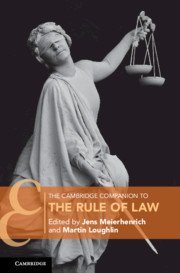25 results
The Political Jurisprudence of Paul W. Kahn
-
- Journal:
- German Law Journal / Volume 24 / Issue 4 / May 2023
- Published online by Cambridge University Press:
- 26 June 2023, pp. 623-636
-
- Article
-
- You have access
- Open access
- HTML
- Export citation
3 - Laski’s Materialist Analysis of the British Constitution
- from Part I - History
-
-
- Book:
- The Cambridge Handbook on the Material Constitution
- Published online:
- 15 January 2023
- Print publication:
- 05 January 2023, pp 64-75
-
- Chapter
- Export citation
14 - In Search of the Constitution
- from Part II - Institutional Pressures and Contested Legitimacy
-
-
- Book:
- The Brexit Challenge for Ireland and the United Kingdom
- Published online:
- 17 August 2021
- Print publication:
- 26 August 2021, pp 313-335
-
- Chapter
- Export citation
Contents
-
- Book:
- The Cambridge Companion to the Rule of Law
- Published online:
- 03 August 2021
- Print publication:
- 12 August 2021, pp vii-ix
-
- Chapter
- Export citation
Part VI - Conclusion
-
- Book:
- The Cambridge Companion to the Rule of Law
- Published online:
- 03 August 2021
- Print publication:
- 12 August 2021, pp 567-621
-
- Chapter
- Export citation
Part I - Introduction
-
- Book:
- The Cambridge Companion to the Rule of Law
- Published online:
- 03 August 2021
- Print publication:
- 12 August 2021, pp 1-22
-
- Chapter
- Export citation
Part V - Trajectories
-
- Book:
- The Cambridge Companion to the Rule of Law
- Published online:
- 03 August 2021
- Print publication:
- 12 August 2021, pp 375-566
-
- Chapter
- Export citation
Bibliography
-
- Book:
- The Cambridge Companion to the Rule of Law
- Published online:
- 03 August 2021
- Print publication:
- 12 August 2021, pp 622-681
-
- Chapter
- Export citation
Contributors
-
- Book:
- The Cambridge Companion to the Rule of Law
- Published online:
- 03 August 2021
- Print publication:
- 12 August 2021, pp x-xii
-
- Chapter
- Export citation
Part III - Moralities
-
- Book:
- The Cambridge Companion to the Rule of Law
- Published online:
- 03 August 2021
- Print publication:
- 12 August 2021, pp 119-258
-
- Chapter
- Export citation
Part II - Histories
-
- Book:
- The Cambridge Companion to the Rule of Law
- Published online:
- 03 August 2021
- Print publication:
- 12 August 2021, pp 23-118
-
- Chapter
- Export citation
Thinking about the Rule of Law
- from Part I - Introduction
-
-
- Book:
- The Cambridge Companion to the Rule of Law
- Published online:
- 03 August 2021
- Print publication:
- 12 August 2021, pp 3-22
-
- Chapter
- Export citation
Part IV - Pathologies
-
- Book:
- The Cambridge Companion to the Rule of Law
- Published online:
- 03 August 2021
- Print publication:
- 12 August 2021, pp 259-374
-
- Chapter
- Export citation
9 - Michael Oakeshott’s Republican Theory of the Rule of Law
- from Part III - Moralities
-
-
- Book:
- The Cambridge Companion to the Rule of Law
- Published online:
- 03 August 2021
- Print publication:
- 12 August 2021, pp 171-185
-
- Chapter
- Export citation
Index
-
- Book:
- The Cambridge Companion to the Rule of Law
- Published online:
- 03 August 2021
- Print publication:
- 12 August 2021, pp 682-702
-
- Chapter
- Export citation
Copyright page
-
- Book:
- The Cambridge Companion to the Rule of Law
- Published online:
- 03 August 2021
- Print publication:
- 12 August 2021, pp vi-vi
-
- Chapter
- Export citation

The Cambridge Companion to the Rule of Law
-
- Published online:
- 03 August 2021
- Print publication:
- 12 August 2021
The Constitution of Europe: the new Kulturkampf?
-
- Journal:
- German Law Journal / Volume 7 / Issue 2 / 01 February 2006
- Published online by Cambridge University Press:
- 06 March 2019, pp. 173-190
-
- Article
-
- You have access
- Export citation
6 - On Constituent Power
- from Part III - The Political Construction of the State
-
-
- Book:
- Constitutionalism beyond Liberalism
- Published online:
- 19 January 2017
- Print publication:
- 26 January 2017, pp 151-175
-
- Chapter
- Export citation
4 - Nomos
-
-
- Book:
- Law, Liberty and State
- Published online:
- 05 June 2015
- Print publication:
- 28 May 2015, pp 65-95
-
- Chapter
- Export citation

